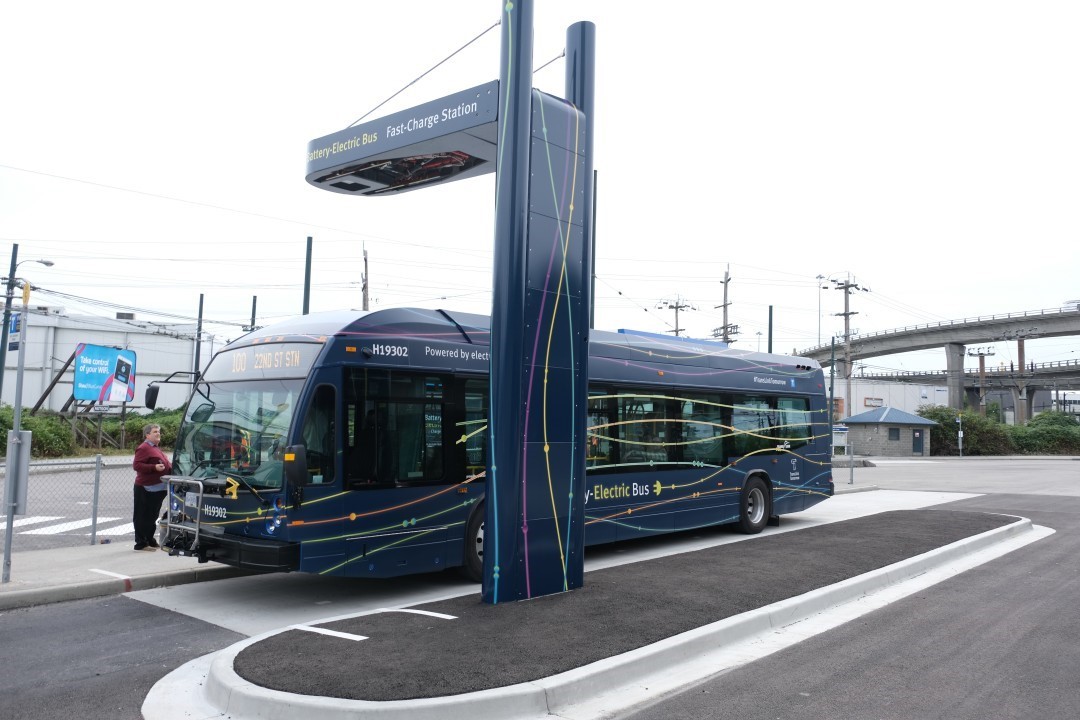Powering up the renewable energy revolution with transit
Powering up the renewable energy revolution with transit

Imagine a future where clean energy is the default fuel of choice for transportation. Where zero emissions vehicles glide through the streets, producing no local carbon emissions or air pollution.
At TransLink, we think that’s what the future of transportation should look like, and that our role will be to help pioneer this future. That’s why we’ve launched cutting edge projects such as our Battery-Electric Bus Pilot today on Route 100, which will help chart a course towards a cleaner transportation future.
Transforming transportation for the climate challenge
In cities around North America, public transit provides economical and low-carbon transportation options for millions of people. By choosing to take a bus or train, instead of a car, you’re already taking an important step to minimize your own environmental footprint.
However, despite the increasing choice in mobility options and improvements in vehicle fuel efficiency, transportation is still a major source of greenhouse gas (GHG) emissions—in fact, transportation is the largest single source of GHGs in North America. In BC, road transportation accounts for a nearly 30 per cent, and growing, share of GHGs emissions—and nearly 40 per cent of Metro Vancouver’s GHGs.
Given the scale of the climate challenge, and to have a hope of meeting our carbon targets, we’re going to need to radically transform our transportation sector on all fronts. That’s where transit authorities come in. Not only to continue to grow public and active transportation, the bread and butter of sustainable mobility, but also to take on the bold role of driving the renewable energy revolution.
The future is electric
We don’t fully know what the makeup of our fleet will be by 2050. Zero emissions vehicles fueled by renewable natural gas or hydrogen could be part of the solution. However, electric vehicles powered by renewable energy will likely be a mainstay.
By many accounts, electric mobility is set to dominate the future. Bloomberg New Energy Finance sees electric vehicles making up nearly 60 per cent of global passenger vehicle sales and 80 per cent of municipal bus sales by 2040. This is where the world is headed, and where British Columbia is going; all new vehicles sold in the province by 2040 will be zero emissions.
And why not—electric vehicles are energy efficient and can economically power up via British Columbia’s nearly 100 per cent renewable grid.
That’s why, last year, TransLink took a bold step by adopting a new target to reduce GHG emissions 80 per cent and to shift to 100 per cent renewable energy by 2050. When we release our Low Carbon Fleet Strategy in November, we will have charted a course to meet these world-leading goals.
Partnerships for tomorrow’s fleets
Transit authorities like TransLink can be renewable energy pioneers. But to fully realize the dream of a clean energy future, they’ll need to act in partnership.
That’s exactly what TransLink’s Battery-Electric Bus Pilot aims to do.
Rolling out thousands of battery-electric buses and fast-charge stations across the region and the country is a major departure from business as usual. Deploying these new technologies will require new infrastructure, funding and investment, operational testing, training, and data collection. And above all a team effort—from industry to research organizations, from different levels of government to utilities and other transit authorities.
Coordinated by the Canadian Urban Transit Research & Innovation Consortium (CUTRIC), the Pilot will test how equipment from different manufacturers work together. Including how battery-electric buses from Canadian companies New Flyer and Nova Bus work with fast-charge stations from ABB and Siemens. And, as part of a pan-Canadian initiative, we’ll be sharing data with and learning from Brampton and York Regional Transit’s experience as they deploy battery-electric buses in the future.
Finally, this work has been enabled by important contributions from the Government of Canada and BC Hydro. British Columbia’s electricity grid is 95 per cent clean energy thanks to the efforts of BC Hydro. Partnerships like these will be critical to deliver zero emissions transportation in the coming years.
Charging into the future
With the roll-out of its Battery-Electric Bus Pilot, TransLink just took an important step towards a renewable energy-powered future. The project will allow us to collect data and gain valuable experience so that we can scale up our battery-electric bus fleet in the future.
This will ultimately benefit our customers, the region, the country, and the climate.
Kevin Desmond, Former TransLink CEO
Kevin Desmond is the former Chief Executive Officer of TransLink, Metro Vancouver’s transportation authority that moves 500,000 people every day. He oversaw planning, financing, and management of a region-wide multimodal transit network that includes bus, rapid transit, passenger ferry, para-transit, and commuter train service, with over 8,000 employees.





